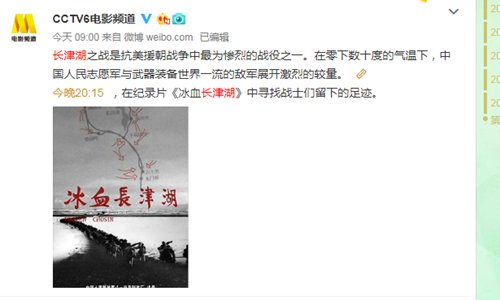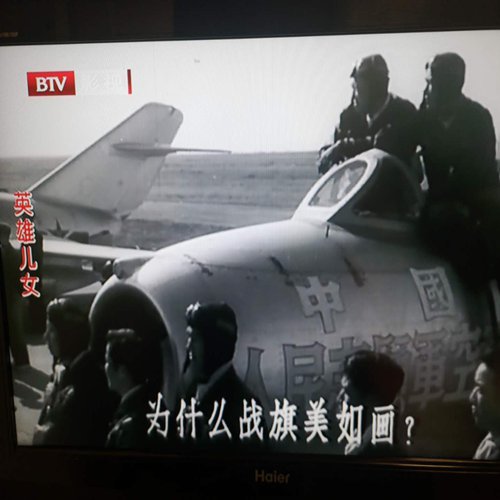Trade war reminds Chinese of Korean War
Endless provocations make Chinese people feel US hostility: expert
Trade war with the US at the moment reminds Chinese of military struggles between China and the US during the Korean War (1950-53) as China's state television broadcast movies related to the war every day from Thursday to Sunday.
China Central Television (CCTV)'s movie channel CCTV-6 announced Sunday via its official account on China's Twitter-like Sina Weibo social media that it would broadcast a documentary about the 1950 Battle of Chosin Reservoir, an important battle in the war that marks the complete withdrawal of US-led UN troops from North Korea.

CCTV-6 said via its Sina Weibo account on Sunday that it would broadcast a documentary about the 1950 Battle of Chosin Reservoir.
CCTV-6 has already broadcast three movies about the Korean War since Thursday and said on Friday that "because of the demand from the audiences," the channel decided to broadcast China-produced Korean War movies.

Heroic Sons and Daughters is broadcasted on Beijing Television BTV on Sunday.
"We are using movies to echo the current era," CCTV-6 said on its Weibo on Saturday.
"We are not afraid of the US, not in the past, not today. Thumbs-up to CCTV," commented one net user who received hundreds of likes.
In recent days, many Chinese people are sharing their memories of these classic films and the history of Korean War on social media.
Historic victory
"Maybe some in the US believes that the Korean War was a draw, but if you know the history well, you will understand it was a symbolic military victory of China against the US," said a military and history expert at a Beijing military academy who asked for anonymity.
For China, the war started from the border between China and North Korea, and ended at the 38th parallel, roughly today's border between North and South Korea.
China "forced" the US to sign an armistice agreement, he noted, and the US didn't win the war at all.
"More importantly, China's military strength at that time was much weaker than the US."
It was very easy to remind Chinese people of the Korean War these days, he told the Global Times.
"Because if China could realize such a symbolic victory in a real war with the US in the 1950s when it was weak and poor, then why should China fear a trade war launched by the US today when it has already become a great power of the world?"
Some net users also said that from the historical lessons, they can learn that maybe conflicts are inevitable.
"You can only reason with the US and get a fair deal after you prove you cannot be defeated. Otherwise the deal will never be fair," one net user commented.
The history of Korean War showed that if China dared not fight, "you can't let a powerful rival understand your determination and bottom line, and the US won't understand that it will pay for its endless bullying," said An Gang, a senior research fellow at the Pangoal Institution, a Beijing-based think tank.
When China fights, "the possibility for China and the US to reach a fair deal is even increasing," An told the Global Times on Sunday.
The trade war is different from a real war like the Korean War that causes huge casualties, but it is getting increasingly obvious that the US is trying to hurt China's interests including national security and economic development, said Lü Xiang, a research fellow of China-US relations at the Chinese Academy of Social Sciences.
It was in this sense that to some extent the trade war and the Korean War are similar, Lü said.
"A treasured experience that we gained from the Korean War is that the leadership of the Communist Party of China and the unity of the people were crucial for China to overcome the aggression from the US in the Korean Peninsula, Lü said. "They are also crucial today."
The endless provocations from the US have made Chinese people feel hostility emanating from Washington DC and they are increasingly angry, Chinese observers warned.
This was dangerous for the US, especially US companies enjoying the benefits of the Chinese market, the same experts said.
Chinese people are united over the trade war, Chinese experts say, where the US is experiencing divergences.
Some US politicians, experts and ordinary people are questioning and opposing the decision of US President Donald Trump's administration, CNN has reported.

